 FOR IMMEDIATE RELEASE
FOR IMMEDIATE RELEASE
APRIL 21, 2022
Georgia is taking steps to ensure the emerging sustainable development carbon market is open to the state’s forests. A special technical advisory committee has been seated to help build Georgia’s Sustainable Development Carbon Registry. The action will supplement Georgia’s existing voluntary Carbon Registry by tracking the amount of carbon stored in commercial construction projects and also making life cycle assessments to measure all carbon impacts from raw material extraction to the building material’s final disposal. Carbon credits can then be quantified and awarded through the voluntary Registry.
The technical committee was created by legislative action that amended the Registry, developed in 2004, to calculate the amount of carbon being absorbed by the state’s forestland. The new amendment will incentivize real estate developers to utilize materials like lumber that continue sequestering carbon after the tree has been harvested and another has been planted in its place.
“The Georgia Forestry Commission is proud to be facilitating this important effort,” said Georgia Forestry Commission Director Tim Lowrimore. “We’ve gathered an extraordinary group of subject experts who are off and running, creating necessary benchmarks for tracking the emission and absorption of carbon in our state. Along with the forest community, architects, builders and others will benefit from a system that builds sustainability into every construction project.”
Members of the technical advisory committee are: Dr. Russell Gentry, Georgia Tech School of Architecture (committee chair); Edie Sonne Hall, Three Trees Consulting; Troy Harris, Director of Timberlands, Jamestown, LLC; Bill Howard, President of Claude Howard Lumber Co.; Dr. Jacek Siry, UGA, Warnell School of Forestry & Natural Resources; Dr. Valerie Thomas, Georgia Tech School of Industrial & Systems Engineering and the School of Public Policy; Ted Miltiades, Dept. of Community Affairs, Director, Office of Construction Codes and Industrialized Buildings; and Brian Campa, Principal, Cooper Carry Architects. JD Harper, Sustainability Officer at Cooper Carry Architects and Devon Dartnell of the Georgia Forestry Commission serve as ex – officio members.
The technical advisory committee has been meeting since December 2021 and members have divided into working subcommittees to establish guidelines for tracking carbon’s distribution in Georgia. There are two mechanisms for securing carbon credits: building-embedded carbon, which measures the total amount by mass of carbon stored within the building products used; and embodied-carbon, a holistic evaluation using a Life Cycle Assessment to measure all carbon impacts, from the extraction of raw materials until the building material’s final disposal. The committee expects their work to be complete by late this year.
“Georgia is the number one forestry state in the nation,” said Lowrimore, “and our private forest landowners provide an enormous carbon sink for the state. By putting numbers and formulas to the carbon cycle process, Georgia is showing strong leadership on an issue that affects us all.”
For more information about how forests capture carbon and other benefits of Georgia’s forests and services of the Georgia Forestry Commission, visit GaTrees.org.
# # #
